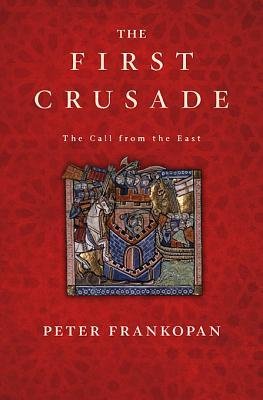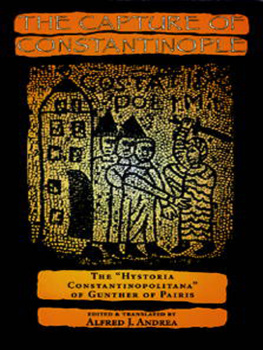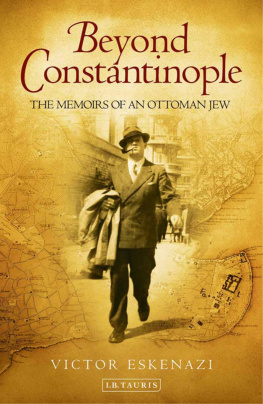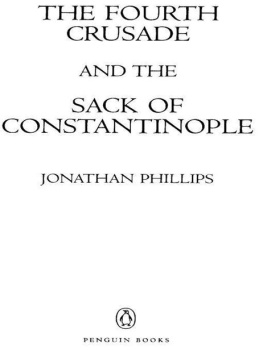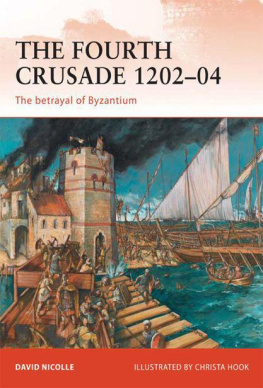Geoffrey de Villehardouin [b.c.1160-d.c.1213]:
Memoirs or Chronicle of The Fourth Crusade and The Conquest of Constantinople
Geoffrey de Villehardouin [b.c.1160-d.c.1213]: Memoirs or Chronicle of The Fourth Crusade and The Conquest of Constantinople, trans. Frank T. Marzials, (London: J.M. Dent, 1908)
THE FIRST PREACHING OF THE CRUSADE
Be it known to you that eleven hundred and ninety-seven years after the Incarnation of our Lord Jesus Christ, in the time of Innocent Pope of Rome, and Philip King of France, and Richard King of England, there was in France a holy man named Fulk of Neuilly - which Neuilly is between Lagni-sur-Marne and Paris - and he was a priest and held the cure of the village. And this said Fulk began to speak of God throughout the Isle-de-France, and the other countries round about; and you must know that by him the Lord wrought many miracles.
Be it known to you further, that the fame of this holy man so spread, that it reached the Pope of Rome, Innocent*; and the Pope sent to France, and ordered the right worthy man to preach the cross (the Crusade) by his authority. And afterwards the Pope sent a cardinal of his, Master Peter of Capua, who himself had taken the cross, to proclaim the Indulgence of which I now tell you, viz., that all who should take the cross and serve in the host for one year, would be de-
[note: Innocent III, elected Pope on the 8th January 1198, at the early age of thirty seven, Innocent III was one of the leading spirits of his time-in every sense a strong man and great Pope. From the beginning of his pontificate he turned his thoughts and policy to the recovery of Jerusalem. ]
livered from all the sins they had committed, and acknowledged in confession. And because this indulgence was so great, the hearts of men were much moved, and many took the cross for the greatness of the pardon.
OF THOSE WHO TOOK THE CROSS
The other year after that right worthy man Fulk had so spoken of God, there was held a tourney in Champagne, at a castle called Ecri, and by God's grace it so happened that Thibaut, Count of Champagne and Brie, took the cross, and the Count Louis of Blois and Chartres likewise; and this was at the beginning of Advent (28th November 1199). Now you must know that this Count Thibaut was but a young man, and not more than twenty-two years of age, and the Count Louis not more than twenty-seven. These two counts were nephews and cousins-german to the King of France, and, on the other part, nephews to the King of England.
With these two counts there took the cross two very high and puissant barons of France, Simon of Montfort*, and Renaud of Montmirail. Great was the fame thereof throughout the land when these two high and puissant men took the cross.
[note: Simon de Monfort - the same one who later crushed the Albigensians and the father of the "English" Simon de Montfort who defeated the royal army at Lewes and was killed at Evesham in 1265].
In the land of Count Thibaut of Champagne took the cross Garnier, Bishop of Troyes, Count Walter of Brienne, Geoffry of Joinville*, who was seneschal of the land, Robert his brother, Walter of Vignory, Walter of Montbliard, Eustace of Conflans, Guy of Plessis his brother, Henry of Arzillires, Oger of Saint-Chron, Villain of Neuilly, Geoffry of Villhardouin, Marshal of Champagne, Geoffry his nephew, William of Nully, Walter of Fuligny, Everard of Montigny, Manasses of l'Isle, Macaire of Sainte-Menehould, Miles the Brabant, Guy of Chappes, Clerembaud his nephew, Renaud of Dampierre, John Foisnous, and many other right worthy men whom this book does not here mention by name.
[note: Geoffry de Joinville - the father of the chronicler Joinville.]
With Count Louis took the cross Gervais of Chtel Herve his son John of Virsin, Oliver of Rochefort, Henry of Mont-
reuil, Payen of Orlans, Peter of Bracietix, Hugh his brother, William of Sains, John of Frialze, Walter of Gaudonville, Hugh of Cormeray, Geoffry his brother, Herve of Beauvoir, Robert of Frouville, Peter his brother, Orri of l'Isle, Robert of Quartier, and many more whom this book does not here mention by name.
In the Isle-de-France took the cross Nevelon, Bishop of Soissons, Matthew of Montmorency, Guy the Castellan of Coucy, his nephew, Robert of Ronsoi, Ferri of Yerres, John his brother, Walter of Saint-Denis, Henry his brother, William of Aunoi, Robert Mauvoisin, Dreux of Crcssonsacq, Bernard of Moreuil, Enguerrand of Boves, Robert his brother, and many more right worthy men with regard to whose names this book is here silent.
At the beginning of the following Lent, on the day when folk are marked with ashes (23rd February 1200), the cross was taken at Bruges by Count Baldwin of Flanders and Hainault, and by the Countess Mary his wife, who was sister to the Count Thibaut of Champagne. Afterwards took the cross, Henry his brother, Thierri his nephew, who was the son of Count Philip of Flanders, William the advocate of Bthune, Conon his brother, John of N1e Castellan of Bruges, Renier of Trit, Reginald his son, Matthew of Wallincourt, James of Avesnes, Baldwin of Beauvoir, Hugh of Beaumetz, Grard of Mancicourt, Odo of Ham, William of Gommegnies, Dreux of Beaurain, Roger of Marck, Eustace of Saubruic, Francis of Colemi, Walter of Bousies, Reginald of Mons, Walter of Tombes, Bernard of Somergen, and many more right worthy men in great number, with regard to whom this book does not speak further.
Afterwards took the cross, Count Hugh of St. Paul. With him took the cross, Peter of Amiens his nephew, Eustace of Canteleu, Nicholas of Mailly, Anscau of Cayeaux, Guy of Houdain, Walter of N1e, Peter his brother, and many other men who are unknown to us.
Directly afterwards took the cross Geoffry of Perche, Stephen his brother, Rotrou of Montfort, Ives of La Jaille, Aimery of Villeroi, Geoffry of Beaumont, and many others whose names I do not know.
THE CRUSADERS SEND SIX ENVOYS TO VENICE
Afterwards the barons held a parliament at Soissons, to settle when they should start, and whither they should wend. But they could come to no agreement, because it did not seem to them that enough people had taken the cross. So during all that year (1200) no two months passed without assemblings in parliament at Compigne. There met all the counts and barons who had taken the cross. Many were the opinions given and considered; but in the end it was agreed that envoys should be sent, the best that could be found, with full powers, as if they were the lords in person, to settle such matters as needed settlement.
Of these envoys, Thibaut, Count of Champagne and Brie, sent two; Baldwin, Count of Flanders and Hainault, two; and Louis, Count of Blois and Chartres, two. The envoys of the Count Thibaut were Geoffry of Villehardouin, Marshal of Champagne, and Miles the Brabant; the envoys of Count Baldwin were Conon of Bthune' and Alard Maquereau, and the envoys of Count Louis were John of Friaise, and Walter of Gaudonville.
To these six envoys the business in hand was fully committed, all the barons delivering to them valid charters, with seals attached, to the effect that they would undertake to maintain and carry out whatever conventions and agreements the envoys might enter into, in all sea ports, and whithersoever else the envoys might fare.
Thus were the six envoys despatched, as you have been told; and they took counsel among themselves, and this was their conclusion: that in Venice they might expect to find a greater number of vessels than in any other port. So they journeyed day by day, till they came thither in the first week of Lent (February 1201).



